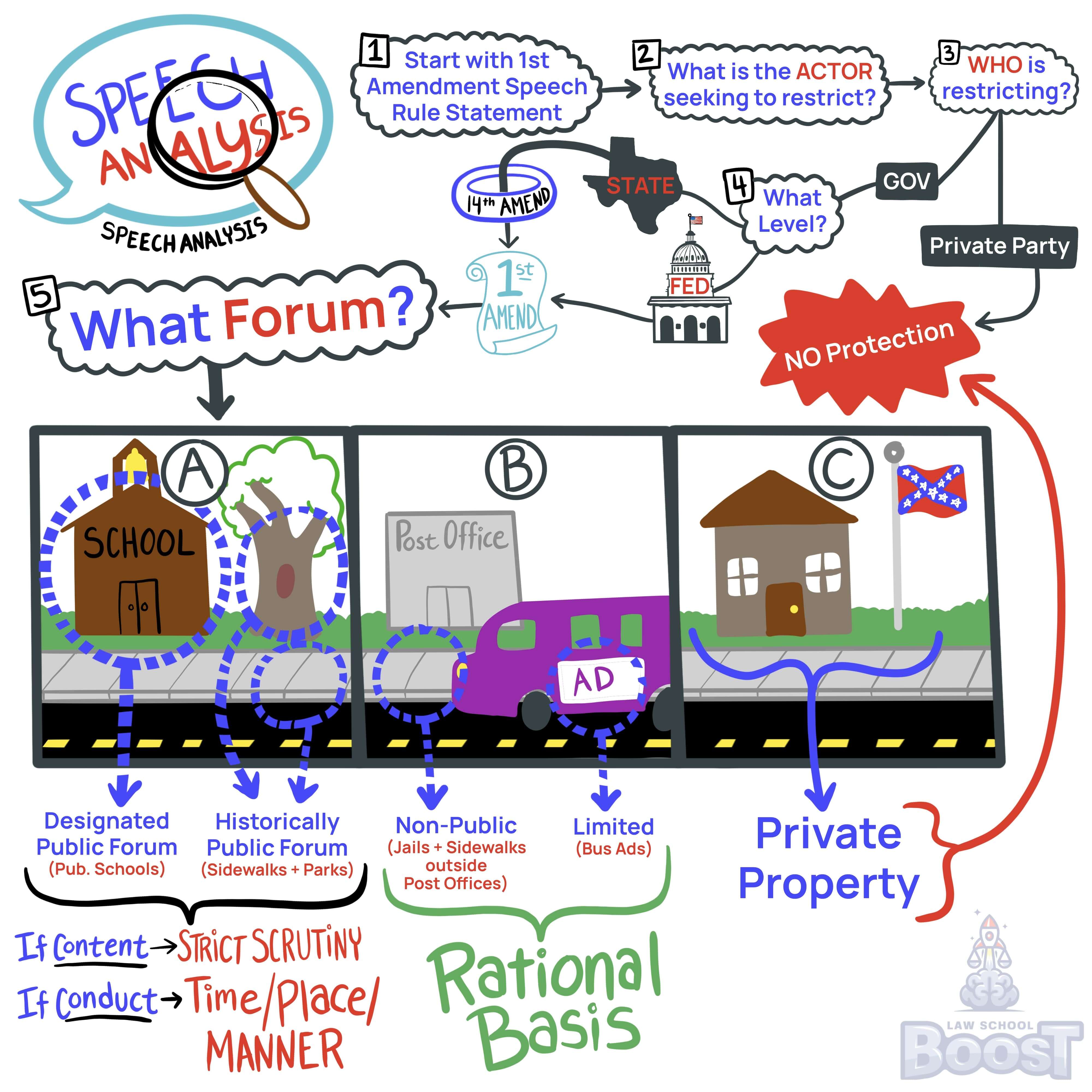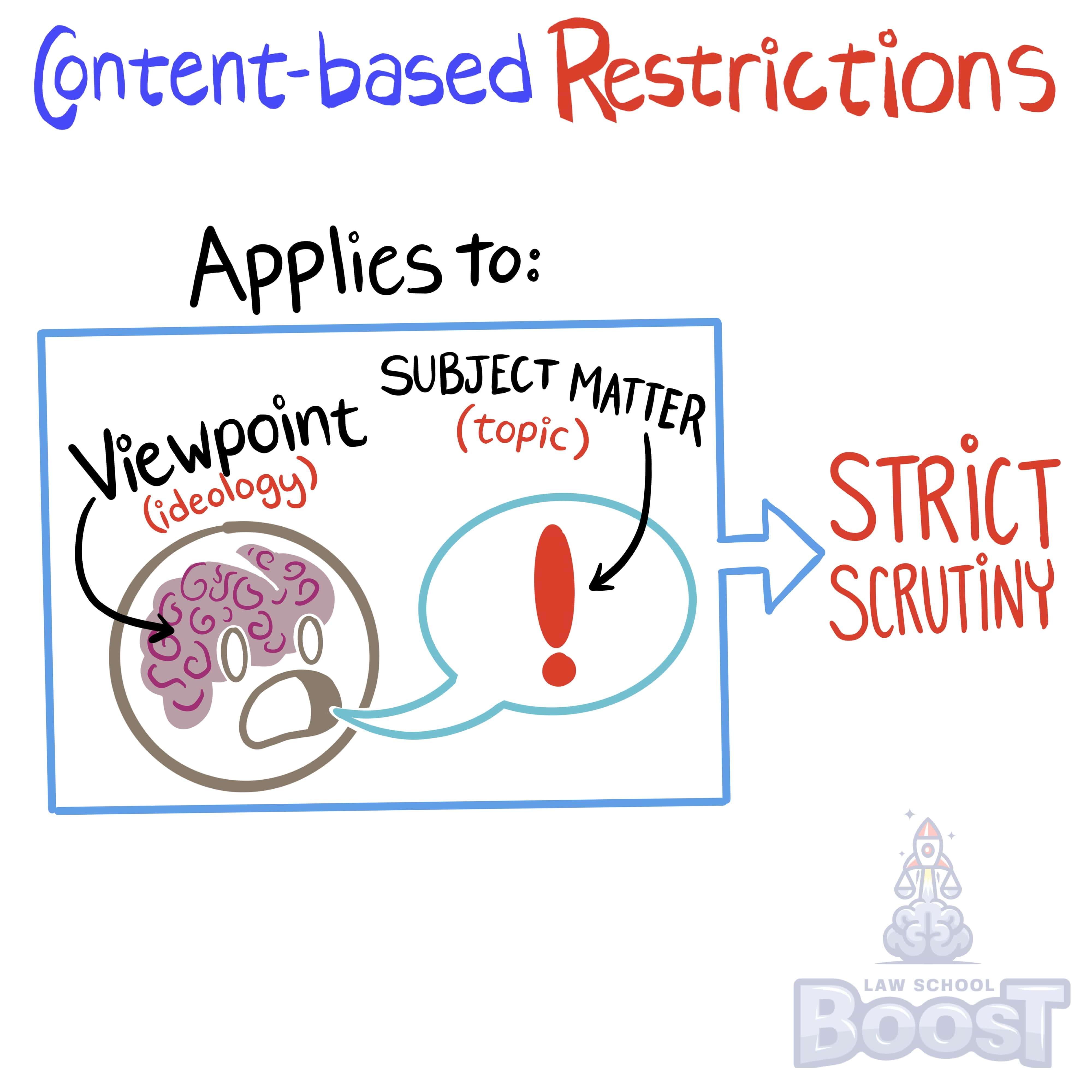🇺🇸
Constitutional Law • First Amendment - Free Speech
CONLAW#116
Legal Definition
The 1st Amendment prohibits Congress from abridging the freedom of speech, and is applicable to the states through the 14th Amendment.
Plain English Explanation
The First Amendment, part of the first ten amendments to the United States Constitution known as the Bill of Rights, was initially aimed at restricting the powers of the national government. Specifically, it forbids Congress from making laws that limit freedom of speech. This means that the government cannot control what people say or write about, especially when it comes to criticizing the government itself or discussing public issues. This is crucial because the ability to debate openly without fear of punishment is a cornerstone of democracy.
The Fourteenth Amendment, which came later, makes this rule apply to state governments as well. Before this amendment, states could potentially limit speech without violating the U.S. Constitution. The application of the First Amendment to the states ensures that all Americans have the same fundamental rights to free speech, regardless of where in the U.S. they live.
The purpose behind these rules is to protect the free exchange of ideas, which helps to ensure a well-informed public and encourages the discovery of truth. Free speech is seen as so vital to democracy that it is given a central place in the American constitutional system, safeguarding individuals' rights to express themselves and to be exposed to a wide range of viewpoints.
The Fourteenth Amendment, which came later, makes this rule apply to state governments as well. Before this amendment, states could potentially limit speech without violating the U.S. Constitution. The application of the First Amendment to the states ensures that all Americans have the same fundamental rights to free speech, regardless of where in the U.S. they live.
The purpose behind these rules is to protect the free exchange of ideas, which helps to ensure a well-informed public and encourages the discovery of truth. Free speech is seen as so vital to democracy that it is given a central place in the American constitutional system, safeguarding individuals' rights to express themselves and to be exposed to a wide range of viewpoints.
Hypothetical
Hypo 1: Bob runs a blog that criticizes the government policies of Hypofornia. The state tries to shut down his blog because it disagrees with his views. Result: Under the First Amendment, which is applied to the states through the Fourteenth Amendment, Bob has the right to express his opinions about the government without fear of state censorship. The attempt by Hypofornia to shut down his blog is unconstitutional because it violates his right to free speech.
Hypo 2: Sam organizes a protest in New Hypoland against a new state law. The state arrests him for making speeches against the law during the protest. Result: The First Amendment protects Sam's right to speak freely against the state law, and his arrest for expressing his views is a violation of this protection. The state's action is not permissible under the constitution as it infringes on Sam's freedom of speech.
Hypo 3: Bob and Sam start a campaign to criticize the mayor of their city in Hypofornia through flyers and online posts. The city enacts an ordinance that bans such criticism, claiming it disturbs public order. Result: The ordinance violates the First Amendment as applied through the Fourteenth Amendment. The city cannot legally suppress Bob and Sam’s right to criticize public officials. Their expression is protected speech, regardless of the city's claim about public order.
Hypo 4: Sam writes a false and damaging article about Bob, a private individual, claiming Bob committed crimes he did not commit. Bob sues for defamation. Result: This situation does not involve the First Amendment’s protection of free speech against government action. Here, the First Amendment does not shield Sam from consequences of his speech because defamation laws protect individuals from false statements that can harm their reputations.
Hypo 5: Ewrong Moose tweets "I'm taking PublicCo private at $420 per share. Funding secured." The SEC sues him for securities fraud, claiming the tweet was false and misled investors. Moose claims his 1st Amendment rights have been violated. Result: The 1st Amendment does not give Mose the right to commit securities fraud. The government can punish false statements intended to manipulate markets. Freedom of speech does not mean freedom from consequences when you lie.
Hypo 6: Twitter bans Ewrong Moose's account after he repeatedly tweets misinformation about COVID-19, including promoting unproven treatments. Moose sues Twitter, claiming they are stifling his free speech in violation of the 1st Amendment. Result: Twitter, as a private company, is not bound by the 1st Amendment. They can moderate content and ban users as they see fit. Moose has no constitutional right to force Twitter to host his controversial opinions.
Hypo 2: Sam organizes a protest in New Hypoland against a new state law. The state arrests him for making speeches against the law during the protest. Result: The First Amendment protects Sam's right to speak freely against the state law, and his arrest for expressing his views is a violation of this protection. The state's action is not permissible under the constitution as it infringes on Sam's freedom of speech.
Hypo 3: Bob and Sam start a campaign to criticize the mayor of their city in Hypofornia through flyers and online posts. The city enacts an ordinance that bans such criticism, claiming it disturbs public order. Result: The ordinance violates the First Amendment as applied through the Fourteenth Amendment. The city cannot legally suppress Bob and Sam’s right to criticize public officials. Their expression is protected speech, regardless of the city's claim about public order.
Hypo 4: Sam writes a false and damaging article about Bob, a private individual, claiming Bob committed crimes he did not commit. Bob sues for defamation. Result: This situation does not involve the First Amendment’s protection of free speech against government action. Here, the First Amendment does not shield Sam from consequences of his speech because defamation laws protect individuals from false statements that can harm their reputations.
Hypo 5: Ewrong Moose tweets "I'm taking PublicCo private at $420 per share. Funding secured." The SEC sues him for securities fraud, claiming the tweet was false and misled investors. Moose claims his 1st Amendment rights have been violated. Result: The 1st Amendment does not give Mose the right to commit securities fraud. The government can punish false statements intended to manipulate markets. Freedom of speech does not mean freedom from consequences when you lie.
Hypo 6: Twitter bans Ewrong Moose's account after he repeatedly tweets misinformation about COVID-19, including promoting unproven treatments. Moose sues Twitter, claiming they are stifling his free speech in violation of the 1st Amendment. Result: Twitter, as a private company, is not bound by the 1st Amendment. They can moderate content and ban users as they see fit. Moose has no constitutional right to force Twitter to host his controversial opinions.
Visual Aids


Related Concepts
Are fighting words protected speech?
Are profane and indecent speech protected?
Can government speech be challenged?
How do you analyze a free speech issue?
Is anonymous speech protected?
Is discretion allowed in determining fees for public demonstrations?
Is speech protected when it incites illegal activity?
May the government seize assets of businesses that violate obscenity laws?
What are content-based restrictions, and which level of scrutiny is applied?
What are designated public forums?
What are limited public forums?
What are non-public forums?
What are prior restraints and when are they valid?
What are public forums?
What are the limits of free speech during a broadcast?
What is the 1st Amendment right to access private property for speech?
What is the constitutionality of laws prohibiting group discrimination?
What level of scrutiny is applied to content-based restrictions on public forums?
What level of scrutiny is applied to court orders suppressing speech?
What level of scrutiny is applied to laws impacting freedom of association?
What level of scrutiny is applied to laws that require disclosure of group membership?
What rights do the press have in addition to those granted to private citizens?
When are obscenities and sexually oriented speech considered obscene?
When are time, place, and manner restrictions on speech valid?
When is a law unconstitutionally overbroad?
When is a law unconstitutionally vague?
When is commercial speech protected, and when is it not?
When is speech by government employees not protected?
When may a private figure recover for defamation if there is no matter of public concern?
When may a private figure recover for defamation regarding a matter of public concern?
When may a public official or figure recover for defamation?
When may the government ban child pornography?
When may the government burden lawful, non-misleading, non-fraudulent commercial speech?
When may the government punish or limit news reporting?
When may the government punish private possession of obscene materials?
When may the government regulate symbolic speech?
When may the government require a license for speech?
When may the government use zoning ordinances to regulate adult businesses?
Which level of scrutiny is applied to content-neutral restrictions?


